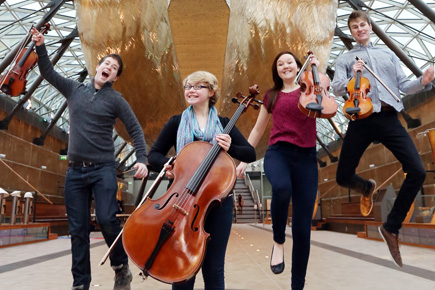Musical Impact
Friday 31 May 2013
A new £1 million project will see the UK’s nine top music conservatoires leading the world’s largest ever study into the health and wellbeing of performing musicians.
Musical Impact is a new four-year research project, starting in September 2013. It aims to generate new knowledge of the physical and mental demands of music making, to contribute new insight into chronic and acute health problems and their impact over time, and to examine effective strategies for health promotion. While musicians typically have a long history of self-sufficiency in managing the challenges of performing, Musical Impact aspires to complement musicians’ own ingenuity by providing comprehensive, evidence-led resources to help maximise their educational and professional opportunities.
The project will be led by Conservatoires UK (CUK) – the organisation which represents nine major UK conservatoires – and will also involve scientists from Cardiff University and Cardiff Metropolitan University. Crucially, these centres of learning will be working with professional musicians and their employers – via the Musicians’ Union and the Association of British Orchestras (ABO) – as well as health practitioners and researchers linked to the British Association for Performing Arts Medicine (BAPAM) and the International Health Humanities Network.
This £1 million project is underpinned by a major £800,000 grant from the Arts and Humanities Research Council (AHRC), with the remaining £200,000 coming from the participating institutions.
The project has three core strands of research:
1. A longitudinal study of physical and mental fitness for performance
This strand will investigate the incidence and extent of injuries and ill-health among musicians working in Britain, as well as the physical, psychological, environmental and musical factors that determine musicians’ health and wellbeing. Led by Aaron Williamon (Royal College of Music), with Rosie Perkins (Royal College of Music), Helen Reid (Guildhall School of Music and Drama) and David Wasley (Cardiff Metropolitan University).
2. The physical and mental demands of practising and performing
This strand will study the physical and mental demands of music making and training using cutting edge physiological monitoring equipment. Led by Emma Redding (Trinity Laban Conservatoire of Music and Dance), with Alan Watson (Cardiff University).
3. Health promotion in music education and the profession
This strand will examine current approaches to promoting health, adapting, applying and evaluating them across music educational and professional contexts. Led by Jane Ginsborg (Royal Northern College of Music), with Stephen Broad (Royal Conservatoire of Scotland).
Professor Colin Lawson – Chair of the CUK Research Forum and Director of the Royal College of Music – commented: “Nothing is more important to the members of CUK than the health and wellbeing of our students. We are delighted to be working together on a project that promises to make such a positive difference to their lives”.
Aaron Williamon, Professor of Performance Science at the Royal College of Music, commented: “I’m thrilled about Musical Impact, which offers an exciting opportunity to make a tangible difference to the lives and health of musicians, from those at the earliest stages of their training to musicians with established careers.”
Emma Redding, Head of Dance Science at Trinity Laban Conservatoire of Music and Dance, commented: “This is the biggest and most significant project of its kind. Its impact will be far-reaching not only for musicians but also those teaching them".
Professor Jane Ginsborg, Associate Dean of Research and Enterprise at the Royal Northern College of Music, commented: “Health and wellbeing are fundamental to music-making at all levels. I am looking forward enormously to collaborating with conservatoire-, university- and industry-based colleagues on a project that has such potential for effecting change.”
Diane Widdison of the Musicians’ Union commented: “We represent over 30,000 professional musicians who work in all areas of the music industry. The health and wellbeing of our members is an integral part of our work, and this project represents an important and necessary area of study.”
Mark Pemberton of the Association of British Orchestras commented: “The ABO is delighted to collaborate on this project. The outcomes of the research will have benefits for the health and wellbeing of professional musicians working in British orchestras and will help ensure that British orchestras continue to deliver the highest standards in musical performance.”
For further information, visit www.rcm.ac.uk/cps/musicalimpact or email Professor Aaron Williamon at aaron.williamon@rcm.ac.uk.








